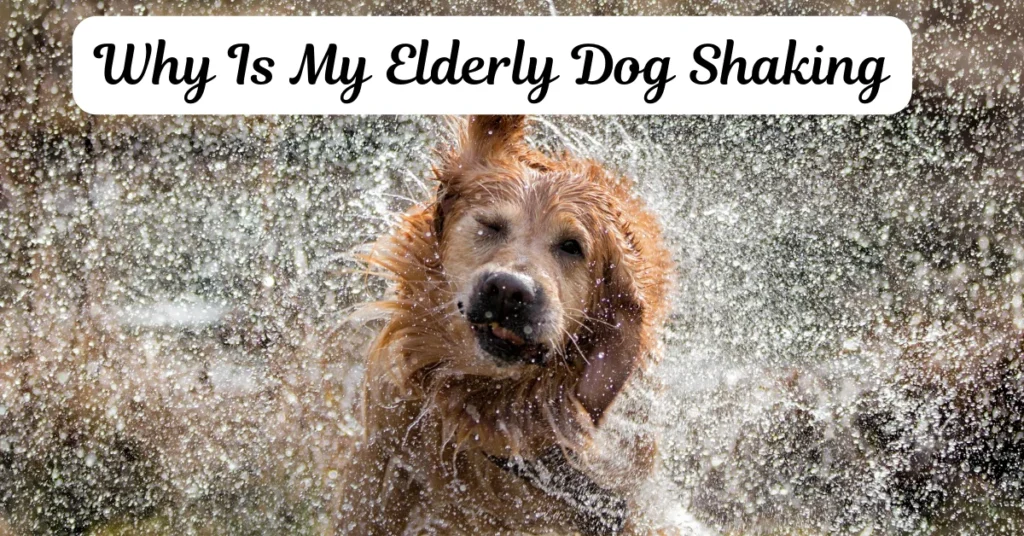Why Is My Elderly Dog Shaking? It could be due to anxiety, feeling cold, or a health issue. Certain dog breeds naturally shake more, which can be confusing for owners. It is essential to observe other behaviors or symptoms that happened behind the dog shaking. Understand the underlying cause and decide if a vet visit is needed. This article would be very helpful for you because in this article I am going to tell you about Why Is My Elderly Dog Shaking?
If your dog is shaking and you are not sure why? It is good to know the difference between shaking due to anxiety and shaking from pain or other issues. Pay close attention to your pet’s behavior if they seem different than usual. Shaking can signal bigger problems, and watching them closely can help you notice other symptoms too.
Here are some main and common reasons that are behind the Elderly dog shaking. Let us come and dive into the given information and come to know about the reasons:
Anxiety and Fear:
Dogs, like people, can shake when they are scared or nervous. Loud noises, such as thunder or fireworks, can make some dogs anxious. This fear can also be triggered by other stressful situations or changes in their environment.
For senior dogs, health issues like vision loss from cataracts or hearing loss. It can affect their confidence and behavior, making them more prone to trembling. Changes in their physical abilities or discomfort from conditions like arthritis can also contribute to shaking or trembling behavior. It is important to consider these factors when trying to understand why your dog may be shaking.
Pain:
If your older dog is shaking, especially in the hind end. It could be a sign of pain caused by arthritis. This condition involves inflammation in the joints, which can lead to discomfort and difficulty moving, particularly in senior dogs.
Dogs can also experience shaking or trembling from generalized pain due to issues like infections, injuries, or dental problems. Your veterinarian may recommend further tests such as X-rays or blood work to pinpoint the source of the pain. Depending on the diagnosis, they may prescribe pain medication or other treatments to help manage your dog’s discomfort. If arthritis is suspected, our comprehensive guide on How to Relieve Arthritis Pain in Dogs. It can provide valuable information and tips.
Nausea:
Nausea in dogs can stem from various health issues like infections, poisoning, liver or kidney disease, among others. It is important to note that a nauseous dog does not always vomit. They may show subtler signs like lip smacking, shaking, excessive swallowing, panting, or drooling.
If you are worried about your dog’s upset tummy, it’s best to contact your vet. They may suggest blood and urine tests to pinpoint the cause. Regular lab work is especially crucial for older dogs to catch problems early, like chronic kidney disease. If you want to know more about collecting lab samples at home.
Excitement:
Even as dogs age, they can still feel a rush of excitement when their family comes home. This burst of joy can sometimes cause them to shake or tremble, showing their enthusiasm.
Similarly, senior dogs may experience trembling or shivering as they eagerly anticipate indulging in their favorite treat or engaging in playtime with their cherished toy. These reactions are often a testament to their enduring happiness and love for life, even as they grow older.
Medication/Toxins:
Several medications, such as certain antibiotics, and antidepressants. The heart medications can cause tremors as a side effect. This occurs due to their impact on neurotransmitters. These are chemicals that transmit signals in the nervous system.
In addition to medications, various toxins can also lead to shaking in dogs. For instance, chocolate contains theobromine, which is toxic to dogs and can cause tremors, among other symptoms. Xylitol is a sugar substitute found in many products like sugar-free gum and candies. It can also be harmful and lead to tremors in dogs. Pesticides, if ingested or absorbed through the skin. It can cause neurological issues and shaking as well.
Cold:
If your dog seems uncomfortable in the cold. You can also limit their time outdoors or provide a heated shelter, such as a doghouse with insulation or a heated pad, to keep them warm.
Moreover, keeping an eye on their behavior and adjusting it accordingly helps ensure their comfort and well-being during colder weather. Additionally, consider scheduling outdoor activities during the warmer parts of the day to minimize exposure to chilly temperatures.
Fever:
Dogs can develop fevers due to various reasons, including infections. Moreover the inflammatory conditions, or underlying health issues. When a dog’s body temperature rises significantly. It can cause them to feel cold and start shivering as a response.
It’s essential to monitor your dog’s temperature and overall condition if you notice them shivering. Especially if they have other symptoms like lethargy, loss of appetite, or unusual behavior. Very high fevers in dogs can indicate a serious health problem that requires immediate veterinary attention.
Old age:
As dogs age, some may develop tremors or weakness. It is often due to weakening joints, arthritis, or simply the effects of old age. Your vet can assist in evaluating and treating these symptoms associated with aging.
Tremors can be a natural part of the aging process for some dogs. Certain breeds are more susceptible to this symptom than others. Understanding your dog’s breed and consulting with your vet can help manage these age-related changes.
FAQs:
Should I be worried if my old dog is shaking?
It’s important to call your vet if your dog acts strangely or if you are worried about their health. If your dog is shaking a lot or has been shaking for a while and shows other unusual signs, contact your vet right away.
What does it mean when a dog is shivering?
Here are the main points due to which the dogs shake or shiver:
- feeling cold
- Excitement
- Stress
- Seeking attention
- Pain
- Illness
- Old age.
It’s crucial to distinguish between normal shaking and signs of a seizure.
Why is my 14-year-old dog twitching while?
Dogs can have quick muscle spasms at night or during the day. Occasionally twitches, especially in senior dogs, are usually okay if they are generally healthy. Certain things like loud noises or strangers can make a dog twitch when they are awake.
Conclusion:
The above article contains complete information about the dog’s shivering or shaking. I have discussed almost all the reasons deeply. It does not need more time to find if you are at my site. Make sure to observe the habits of your puppy and you should also observe the current situation. Whenever you feel any change, you should know there is some issue. So keep checking your puppy and stay in contact with each other.

